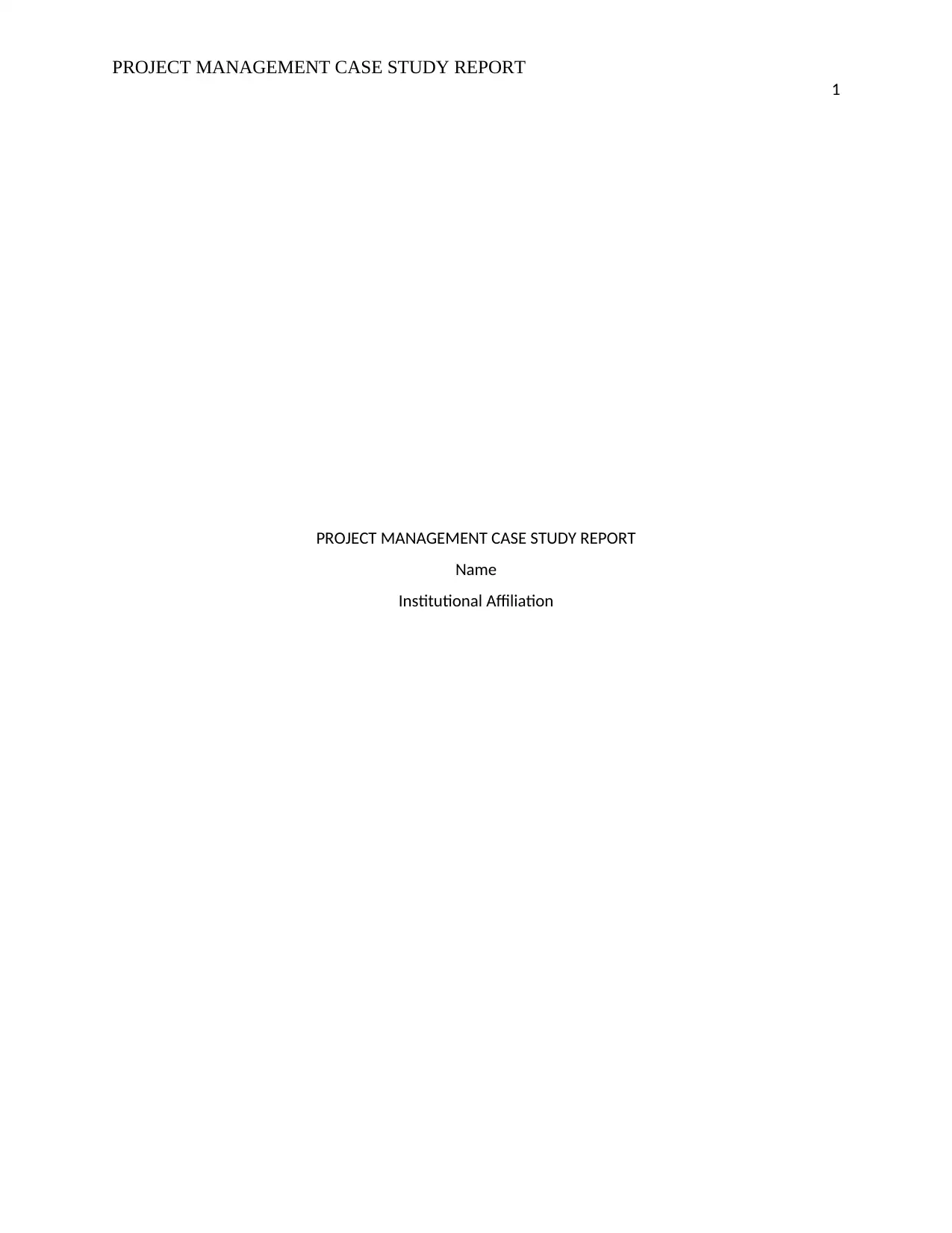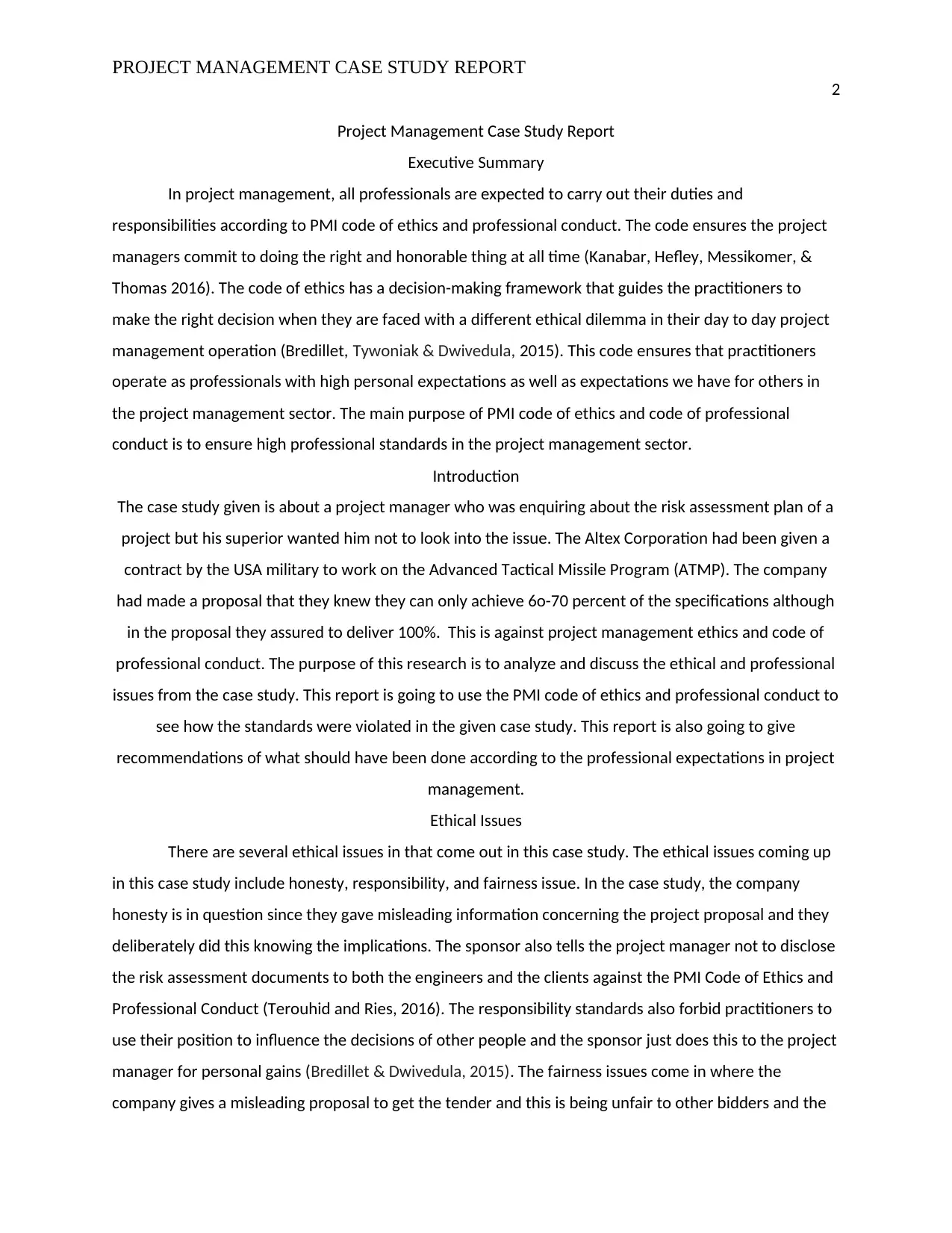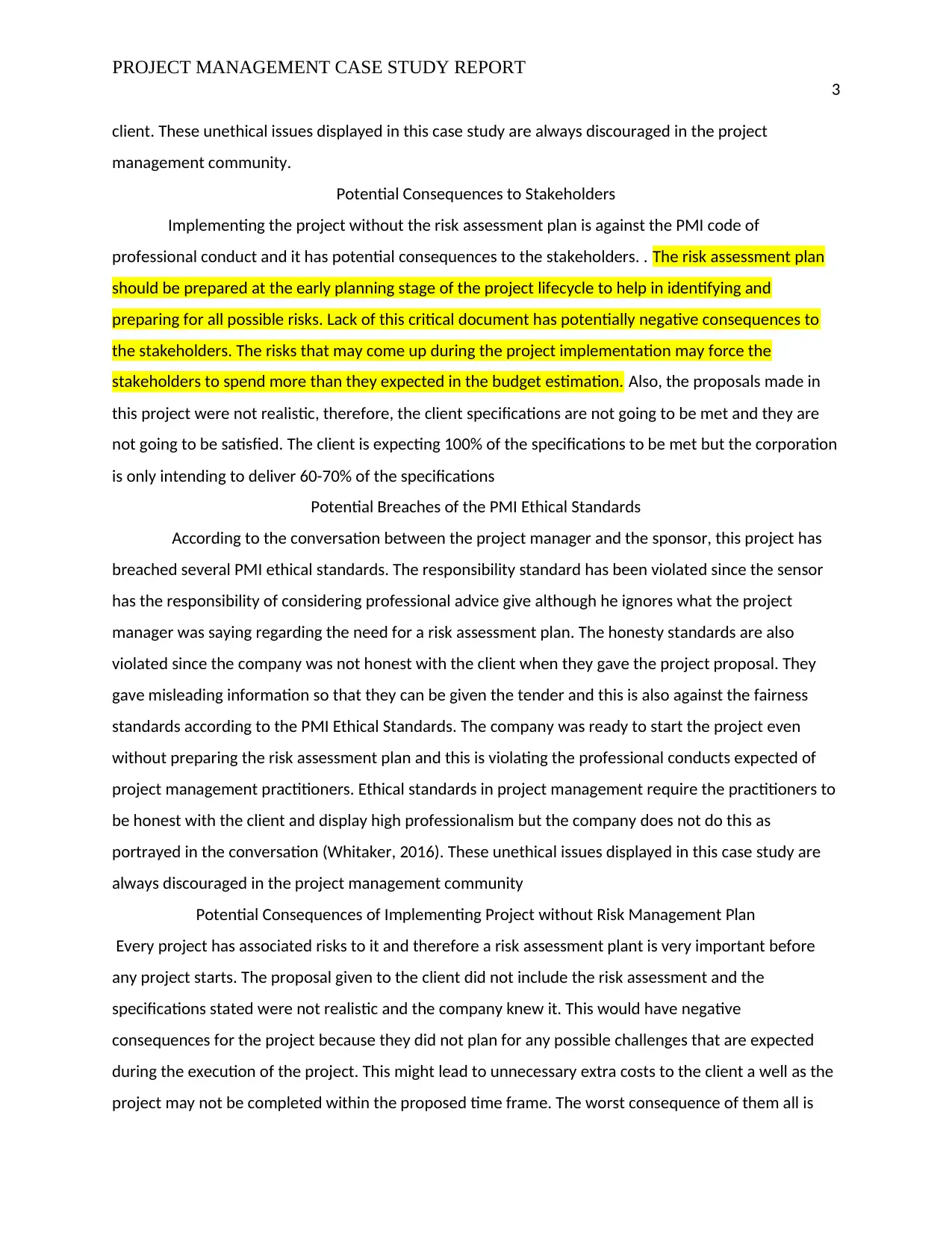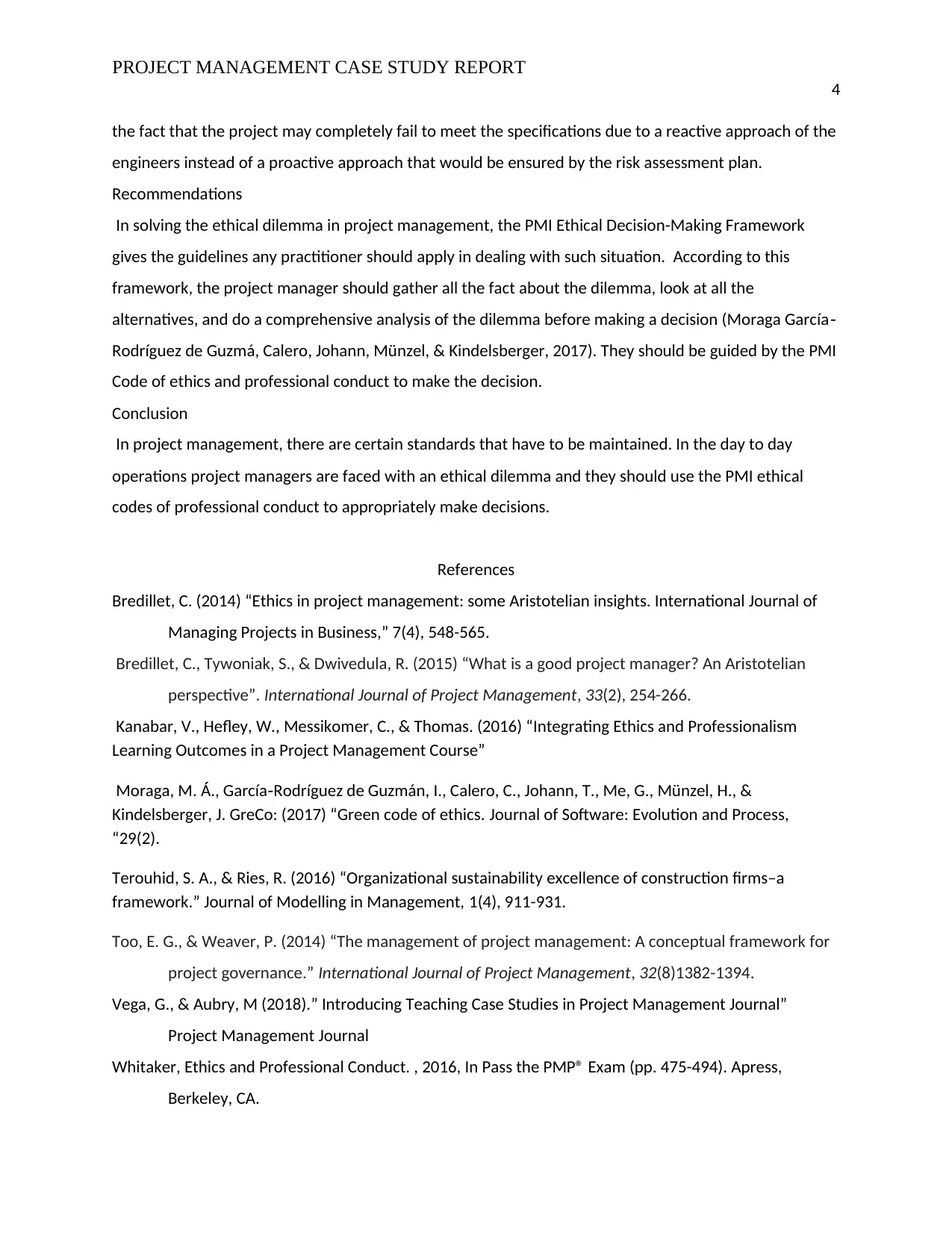Project Management Case Study Report: Ethical Dilemma Analysis
VerifiedAdded on 2021/06/18
|4
|1450
|127
Case Study
AI Summary
This project management case study report analyzes a scenario where a company, Altex Corporation, faces ethical dilemmas while working on the Advanced Tactical Missile Program (ATMP). The report identifies breaches of the PMI code of ethics and professional conduct, focusing on issues of honesty, responsibility, and fairness. The company provided misleading information in its proposal, and the sponsor instructed the project manager to ignore the risk assessment plan. The report highlights potential consequences for stakeholders, including budget overruns and failure to meet project specifications. It details violations of PMI ethical standards, such as a lack of honesty and responsibility. Recommendations are provided based on the PMI Ethical Decision-Making Framework, emphasizing the importance of gathering facts, considering alternatives, and making decisions guided by ethical codes. The conclusion stresses the importance of maintaining ethical standards in project management and using the PMI ethical codes to navigate ethical dilemmas.

PROJECT MANAGEMENT CASE STUDY REPORT
1
PROJECT MANAGEMENT CASE STUDY REPORT
Name
Institutional Affiliation
1
PROJECT MANAGEMENT CASE STUDY REPORT
Name
Institutional Affiliation
Paraphrase This Document
Need a fresh take? Get an instant paraphrase of this document with our AI Paraphraser

PROJECT MANAGEMENT CASE STUDY REPORT
2
Project Management Case Study Report
Executive Summary
In project management, all professionals are expected to carry out their duties and
responsibilities according to PMI code of ethics and professional conduct. The code ensures the project
managers commit to doing the right and honorable thing at all time (Kanabar, Hefley, Messikomer, &
Thomas 2016). The code of ethics has a decision-making framework that guides the practitioners to
make the right decision when they are faced with a different ethical dilemma in their day to day project
management operation (Bredillet, Tywoniak & Dwivedula, 2015). This code ensures that practitioners
operate as professionals with high personal expectations as well as expectations we have for others in
the project management sector. The main purpose of PMI code of ethics and code of professional
conduct is to ensure high professional standards in the project management sector.
Introduction
The case study given is about a project manager who was enquiring about the risk assessment plan of a
project but his superior wanted him not to look into the issue. The Altex Corporation had been given a
contract by the USA military to work on the Advanced Tactical Missile Program (ATMP). The company
had made a proposal that they knew they can only achieve 6o-70 percent of the specifications although
in the proposal they assured to deliver 100%. This is against project management ethics and code of
professional conduct. The purpose of this research is to analyze and discuss the ethical and professional
issues from the case study. This report is going to use the PMI code of ethics and professional conduct to
see how the standards were violated in the given case study. This report is also going to give
recommendations of what should have been done according to the professional expectations in project
management.
Ethical Issues
There are several ethical issues in that come out in this case study. The ethical issues coming up
in this case study include honesty, responsibility, and fairness issue. In the case study, the company
honesty is in question since they gave misleading information concerning the project proposal and they
deliberately did this knowing the implications. The sponsor also tells the project manager not to disclose
the risk assessment documents to both the engineers and the clients against the PMI Code of Ethics and
Professional Conduct (Terouhid and Ries, 2016). The responsibility standards also forbid practitioners to
use their position to influence the decisions of other people and the sponsor just does this to the project
manager for personal gains (Bredillet & Dwivedula, 2015). The fairness issues come in where the
company gives a misleading proposal to get the tender and this is being unfair to other bidders and the
2
Project Management Case Study Report
Executive Summary
In project management, all professionals are expected to carry out their duties and
responsibilities according to PMI code of ethics and professional conduct. The code ensures the project
managers commit to doing the right and honorable thing at all time (Kanabar, Hefley, Messikomer, &
Thomas 2016). The code of ethics has a decision-making framework that guides the practitioners to
make the right decision when they are faced with a different ethical dilemma in their day to day project
management operation (Bredillet, Tywoniak & Dwivedula, 2015). This code ensures that practitioners
operate as professionals with high personal expectations as well as expectations we have for others in
the project management sector. The main purpose of PMI code of ethics and code of professional
conduct is to ensure high professional standards in the project management sector.
Introduction
The case study given is about a project manager who was enquiring about the risk assessment plan of a
project but his superior wanted him not to look into the issue. The Altex Corporation had been given a
contract by the USA military to work on the Advanced Tactical Missile Program (ATMP). The company
had made a proposal that they knew they can only achieve 6o-70 percent of the specifications although
in the proposal they assured to deliver 100%. This is against project management ethics and code of
professional conduct. The purpose of this research is to analyze and discuss the ethical and professional
issues from the case study. This report is going to use the PMI code of ethics and professional conduct to
see how the standards were violated in the given case study. This report is also going to give
recommendations of what should have been done according to the professional expectations in project
management.
Ethical Issues
There are several ethical issues in that come out in this case study. The ethical issues coming up
in this case study include honesty, responsibility, and fairness issue. In the case study, the company
honesty is in question since they gave misleading information concerning the project proposal and they
deliberately did this knowing the implications. The sponsor also tells the project manager not to disclose
the risk assessment documents to both the engineers and the clients against the PMI Code of Ethics and
Professional Conduct (Terouhid and Ries, 2016). The responsibility standards also forbid practitioners to
use their position to influence the decisions of other people and the sponsor just does this to the project
manager for personal gains (Bredillet & Dwivedula, 2015). The fairness issues come in where the
company gives a misleading proposal to get the tender and this is being unfair to other bidders and the

PROJECT MANAGEMENT CASE STUDY REPORT
3
client. These unethical issues displayed in this case study are always discouraged in the project
management community.
Potential Consequences to Stakeholders
Implementing the project without the risk assessment plan is against the PMI code of
professional conduct and it has potential consequences to the stakeholders. . The risk assessment plan
should be prepared at the early planning stage of the project lifecycle to help in identifying and
preparing for all possible risks. Lack of this critical document has potentially negative consequences to
the stakeholders. The risks that may come up during the project implementation may force the
stakeholders to spend more than they expected in the budget estimation. Also, the proposals made in
this project were not realistic, therefore, the client specifications are not going to be met and they are
not going to be satisfied. The client is expecting 100% of the specifications to be met but the corporation
is only intending to deliver 60-70% of the specifications
Potential Breaches of the PMI Ethical Standards
According to the conversation between the project manager and the sponsor, this project has
breached several PMI ethical standards. The responsibility standard has been violated since the sensor
has the responsibility of considering professional advice give although he ignores what the project
manager was saying regarding the need for a risk assessment plan. The honesty standards are also
violated since the company was not honest with the client when they gave the project proposal. They
gave misleading information so that they can be given the tender and this is also against the fairness
standards according to the PMI Ethical Standards. The company was ready to start the project even
without preparing the risk assessment plan and this is violating the professional conducts expected of
project management practitioners. Ethical standards in project management require the practitioners to
be honest with the client and display high professionalism but the company does not do this as
portrayed in the conversation (Whitaker, 2016). These unethical issues displayed in this case study are
always discouraged in the project management community
Potential Consequences of Implementing Project without Risk Management Plan
Every project has associated risks to it and therefore a risk assessment plant is very important before
any project starts. The proposal given to the client did not include the risk assessment and the
specifications stated were not realistic and the company knew it. This would have negative
consequences for the project because they did not plan for any possible challenges that are expected
during the execution of the project. This might lead to unnecessary extra costs to the client a well as the
project may not be completed within the proposed time frame. The worst consequence of them all is
3
client. These unethical issues displayed in this case study are always discouraged in the project
management community.
Potential Consequences to Stakeholders
Implementing the project without the risk assessment plan is against the PMI code of
professional conduct and it has potential consequences to the stakeholders. . The risk assessment plan
should be prepared at the early planning stage of the project lifecycle to help in identifying and
preparing for all possible risks. Lack of this critical document has potentially negative consequences to
the stakeholders. The risks that may come up during the project implementation may force the
stakeholders to spend more than they expected in the budget estimation. Also, the proposals made in
this project were not realistic, therefore, the client specifications are not going to be met and they are
not going to be satisfied. The client is expecting 100% of the specifications to be met but the corporation
is only intending to deliver 60-70% of the specifications
Potential Breaches of the PMI Ethical Standards
According to the conversation between the project manager and the sponsor, this project has
breached several PMI ethical standards. The responsibility standard has been violated since the sensor
has the responsibility of considering professional advice give although he ignores what the project
manager was saying regarding the need for a risk assessment plan. The honesty standards are also
violated since the company was not honest with the client when they gave the project proposal. They
gave misleading information so that they can be given the tender and this is also against the fairness
standards according to the PMI Ethical Standards. The company was ready to start the project even
without preparing the risk assessment plan and this is violating the professional conducts expected of
project management practitioners. Ethical standards in project management require the practitioners to
be honest with the client and display high professionalism but the company does not do this as
portrayed in the conversation (Whitaker, 2016). These unethical issues displayed in this case study are
always discouraged in the project management community
Potential Consequences of Implementing Project without Risk Management Plan
Every project has associated risks to it and therefore a risk assessment plant is very important before
any project starts. The proposal given to the client did not include the risk assessment and the
specifications stated were not realistic and the company knew it. This would have negative
consequences for the project because they did not plan for any possible challenges that are expected
during the execution of the project. This might lead to unnecessary extra costs to the client a well as the
project may not be completed within the proposed time frame. The worst consequence of them all is
⊘ This is a preview!⊘
Do you want full access?
Subscribe today to unlock all pages.

Trusted by 1+ million students worldwide

PROJECT MANAGEMENT CASE STUDY REPORT
4
the fact that the project may completely fail to meet the specifications due to a reactive approach of the
engineers instead of a proactive approach that would be ensured by the risk assessment plan.
Recommendations
In solving the ethical dilemma in project management, the PMI Ethical Decision-Making Framework
gives the guidelines any practitioner should apply in dealing with such situation. According to this
framework, the project manager should gather all the fact about the dilemma, look at all the
alternatives, and do a comprehensive analysis of the dilemma before making a decision (Moraga García‐
Rodríguez de Guzmá, Calero, Johann, Münzel, & Kindelsberger, 2017). They should be guided by the PMI
Code of ethics and professional conduct to make the decision.
Conclusion
In project management, there are certain standards that have to be maintained. In the day to day
operations project managers are faced with an ethical dilemma and they should use the PMI ethical
codes of professional conduct to appropriately make decisions.
References
Bredillet, C. (2014) “Ethics in project management: some Aristotelian insights. International Journal of
Managing Projects in Business,” 7(4), 548-565.
Bredillet, C., Tywoniak, S., & Dwivedula, R. (2015) “What is a good project manager? An Aristotelian
perspective”. International Journal of Project Management, 33(2), 254-266.
Kanabar, V., Hefley, W., Messikomer, C., & Thomas. (2016) “Integrating Ethics and Professionalism
Learning Outcomes in a Project Management Course”
Moraga, M. Á., García Rodríguez de Guzmán, I., Calero, C., Johann, T., Me, G., Münzel, H., &‐
Kindelsberger, J. GreCo: (2017) “Green code of ethics. Journal of Software: Evolution and Process,
“29(2).
Terouhid, S. A., & Ries, R. (2016) “Organizational sustainability excellence of construction firms–a
framework.” Journal of Modelling in Management, 1(4), 911-931.
Too, E. G., & Weaver, P. (2014) “The management of project management: A conceptual framework for
project governance.” International Journal of Project Management, 32(8)1382-1394.
Vega, G., & Aubry, M (2018).” Introducing Teaching Case Studies in Project Management Journal”
Project Management Journal
Whitaker, Ethics and Professional Conduct. , 2016, In Pass the PMP® Exam (pp. 475-494). Apress,
Berkeley, CA.
4
the fact that the project may completely fail to meet the specifications due to a reactive approach of the
engineers instead of a proactive approach that would be ensured by the risk assessment plan.
Recommendations
In solving the ethical dilemma in project management, the PMI Ethical Decision-Making Framework
gives the guidelines any practitioner should apply in dealing with such situation. According to this
framework, the project manager should gather all the fact about the dilemma, look at all the
alternatives, and do a comprehensive analysis of the dilemma before making a decision (Moraga García‐
Rodríguez de Guzmá, Calero, Johann, Münzel, & Kindelsberger, 2017). They should be guided by the PMI
Code of ethics and professional conduct to make the decision.
Conclusion
In project management, there are certain standards that have to be maintained. In the day to day
operations project managers are faced with an ethical dilemma and they should use the PMI ethical
codes of professional conduct to appropriately make decisions.
References
Bredillet, C. (2014) “Ethics in project management: some Aristotelian insights. International Journal of
Managing Projects in Business,” 7(4), 548-565.
Bredillet, C., Tywoniak, S., & Dwivedula, R. (2015) “What is a good project manager? An Aristotelian
perspective”. International Journal of Project Management, 33(2), 254-266.
Kanabar, V., Hefley, W., Messikomer, C., & Thomas. (2016) “Integrating Ethics and Professionalism
Learning Outcomes in a Project Management Course”
Moraga, M. Á., García Rodríguez de Guzmán, I., Calero, C., Johann, T., Me, G., Münzel, H., &‐
Kindelsberger, J. GreCo: (2017) “Green code of ethics. Journal of Software: Evolution and Process,
“29(2).
Terouhid, S. A., & Ries, R. (2016) “Organizational sustainability excellence of construction firms–a
framework.” Journal of Modelling in Management, 1(4), 911-931.
Too, E. G., & Weaver, P. (2014) “The management of project management: A conceptual framework for
project governance.” International Journal of Project Management, 32(8)1382-1394.
Vega, G., & Aubry, M (2018).” Introducing Teaching Case Studies in Project Management Journal”
Project Management Journal
Whitaker, Ethics and Professional Conduct. , 2016, In Pass the PMP® Exam (pp. 475-494). Apress,
Berkeley, CA.
1 out of 4
Related Documents
Your All-in-One AI-Powered Toolkit for Academic Success.
+13062052269
info@desklib.com
Available 24*7 on WhatsApp / Email
![[object Object]](/_next/static/media/star-bottom.7253800d.svg)
Unlock your academic potential
Copyright © 2020–2026 A2Z Services. All Rights Reserved. Developed and managed by ZUCOL.





